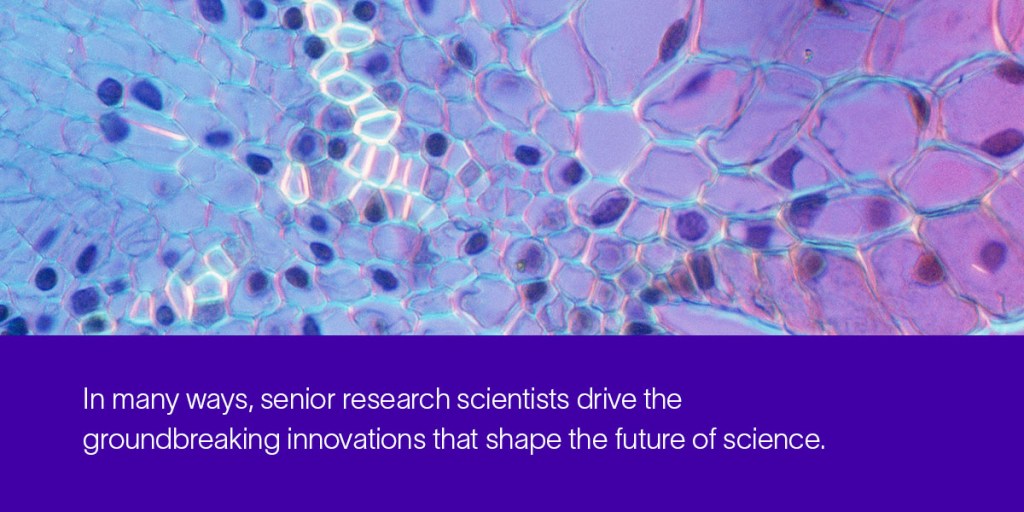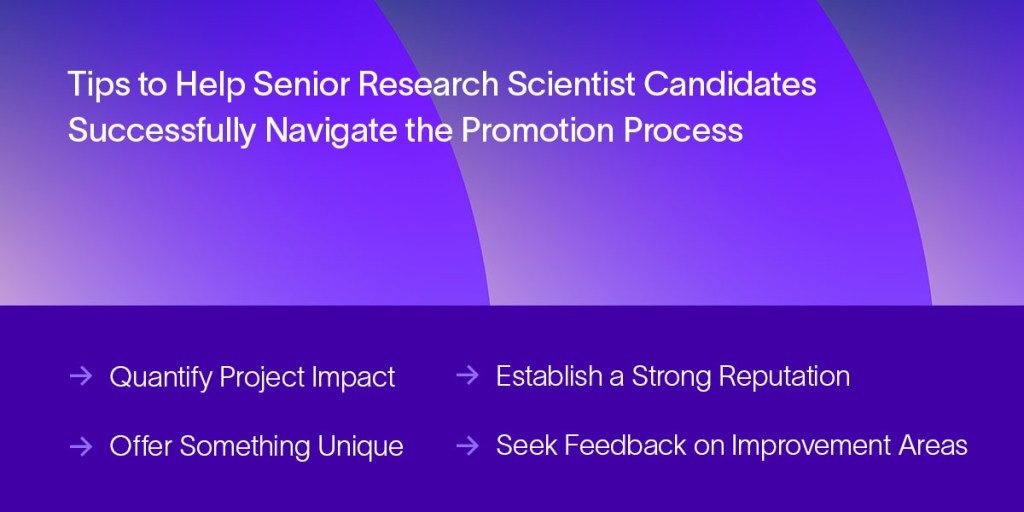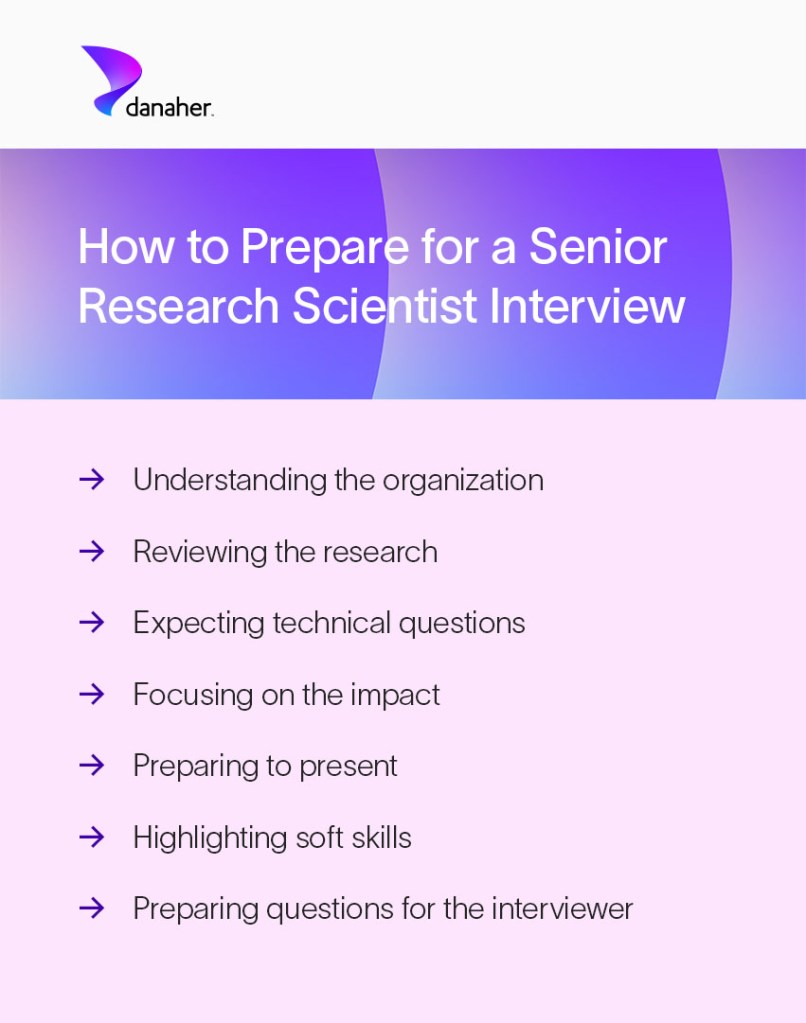
As leaders in their field, senior research scientists spearhead research projects, drive innovation and change lives. Along with positively impacting various fields, a senior research scientist must also handle increased responsibilities and take on leadership roles — mentoring research scientist associates and creating a culture where they can achieve their potential.
Many people passionate about science and innovation aim to advance to a senior research scientist role. Understanding how to become a biotechnology senior research scientist can help applicants achieve their long-term career goals.
Table of Contents
- What Does a Senior Research Scientist Do?
- What Skills Do Senior Research Scientists Need?
- Educational and Experience Requirements
- How to Prepare for a Senior Research Scientist Interview
- Senior Research Scientist Positions at Danaher
What Does a Senior Research Scientist Do?
A senior research scientist is a qualified senior research professional specializing in a particular scientific study area. Their years of passion, dedication and experience have put them in a supervisory position for various research projects. Senior research scientists also manage other scientists and assistants within a laboratory environment. They may also mentor junior research scientists, passing on their skills to a new generation so they can make a meaningful difference.
Senior research scientists have as many responsibilities as other scientists in a laboratory. They also have additional training and authority to lead research projects and complete more complex tasks. Find out what a research scientist does by exploring common roles and responsibilities below.
Conduct Research Projects

Senior research scientists help advance scientific knowledge and drive innovation. They hold the responsibility for designing, planning and executing research projects that address specific challenges.
As visionaries in their specific niche, these professionals also mentor new scientists, cultivating a culture of fearless dedication and excellence within their organization. In many ways, senior research scientists drive the groundbreaking innovations that shape the future of science.
When conducting research projects, senior research scientists:
- Define and manage experiments.
- Identify research needs.
- Conduct complex research.
- Analyze data.
- Draft research papers.
- Prepare funding proposals.
- Devise unique solutions to pressing global challenges.
- Maintain quality and safety in a laboratory setting.
Lead Teams
Senior research scientists must solve complex problems and pioneer innovation and discovery in their niche fields. A strong senior research scientist combines their extensive expertise with robust leadership, communication and problem-solving. They oversee and guide other researchers, including students, technicians and junior scientists.
Taking the leadership role means providing direction and mentorship to their team members. Senior research scientists must also set the tone for research projects, creating a culture of collaboration and innovation. They also manage each project’s resources, timeline and budget and report on their status and outcomes.

Leading a research team requires a specialized skill. Senior research scientists must strike a delicate balance between providing direction and allowing for intellectual freedom. They should cultivate an environment where each team member feels valued and comfortable contributing their best work, even if that means taking risks. Some of their primary leadership responsibilities include:
- Collaborating with other professionals on groundbreaking projects.
- Coordinating fieldwork.
- Mentoring, supervising and supporting junior staff.
Innovate and Develop Solutions
A senior research scientist’s job extends beyond research. As innovators and drivers of progress, they transform complex scientific discoveries into practical solutions that enrich lives. They combine their expertise and creativity to design new products, technologies and processes that could transform their industry and society.
Share Research Findings
The senior scientist must also share the team’s findings with the public and the scientific community. However, their role extends beyond delivering information. They must also highlight how the research impacts their field and their communities. They write research papers that describe the study’s implications and deliver presentations and seminars.
Senior research scientists also review and evaluate other scientist’s work. These passionate and dedicated individuals work across many industries and specializations, pioneering solutions in biotechnology, medical research, life sciences and many other applications.
They face many career challenges, including policy changes and securing funding. Like reaching the top of any field, becoming a senior research scientist requires considerable commitment and dedication.
Consult and Advise on Research

As a trusted expert in their field, a senior research scientist often advises industry leaders on research, using their past findings and experience to inform decisions, practices and policies affecting their field. They must constantly expand and update their research skills and keep up with the latest industry developments to effectively fulfill this role.
What Skills Do Senior Research Scientists Need?
Senior research scientists often make a meaningful difference to the scientific community and change millions of lives. They need many hard and soft skills to balance their roles as leaders and scientists:
- Excellent communication: A senior research scientist gathers funding for various projects, provides expert opinions and collaborates with other specialists. Strong written and verbal communication skills allow them to gather insight and consider different views on results.
- Attention to detail: A senior research scientist holds the responsibility for the accuracy and efficacy of the studies they lead. Attention to detail helps them manage all the variables of an experiment.
- Patience: Many studies take months or even years to achieve usable results. Some senior research scientists may work on the same projects for decades. Patience, focus and consistency help anyone looking to advance into a senior research position.
- Technical knowledge: Science intertwines with information technology (IT). Technical skills, then, assist with turning scientific data into charts and funding proposals. Senior research scientists may also create tests and experiments using advanced software.

- Problem-solving: Senior research scientists may be tasked with solving some of the world’s most pressing medical and biotechnology problems. A solution-focused outlook and excellent critical thinking skills help them conduct research that will most likely make a meaningful difference.
- Analytical skills: A senior research scientist’s primary responsibility involves transforming raw data into practical information they can use to change lives. Analyzing data allows them to condense information and report it easily in research papers and other documents.
- Time management: One of a senior research scientist’s most important tasks involves planning and defining timelines for research projects and scientific studies. As funding often depends on these time estimates, they must be able to predict the timeline and stick to it wherever possible to ensure accurate and consistent results.
- Teamwork and interpersonal skills: Scientists often work alongside other experts, collaborating and bringing their specific expertise to various projects. Senior research scientists should have excellent interpersonal skills to collaborate with their peers and mentor junior scientists effectively.
Educational and Experience Requirements
Advancing to a career as a senior research scientist requires years of education and a track record of successful projects. Education requirements for senior research scientists include a bachelor’s degree in a related field, such as chemistry, physics, mathematics or statistics. Most applicants have a master’s degree or a doctorate in their chosen discipline, which allows them to gain more in-depth knowledge and expertise in a specific field. However, it’s possible to become a senior research scientist without a PhD.
Senior research scientists must also have extensive research experience in their chosen field. Over time, research experience helps them develop the necessary skills, such as data analysis, critical thinking and problem-solving skills. They also create a robust research portfolio by working as a research assistant, university fellow or associate.

Science, technology, engineering and mathematics (STEM) fields progress and evolve rapidly as pioneers in the industry discover new and exciting technologies. Aspiring senior research scientists should devote time to continuous learning and stay updated on the latest trends and technologies. Additional certifications and specialized training enhance candidates’ qualifications, making them a better fit for the senior research scientist role.
Developing a Research Niche
Many senior research scientists have a specific niche — the area or topic they focus on and feel passionate about. Aspiring senior scientists should consider developing their niche to establish a solid reputation and gain credibility in their fields. Having a niche also helps to attract funding and exciting collaboration opportunities.
Anyone aiming to become a senior research scientist can develop a niche by identifying a gap or challenge in the existing literature or status quo. They take risks and push boundaries by conducting unique research. Once they have a potential solution, they should share it via publications and presentations.
Candidates should start by exploring what ignites their passions within their field. From there, they can narrow their focus and build expertise through networking and publishing.
Building a Strong Professional Network
Networking with peers, industry professionals and potential collaborators benefits senior research scientist candidates. They should proactively attend and contribute to conferences, workshops and seminars to engage with experts and their peers. They should also join professional associations and societies to access valuable resources and opportunities in their fields.
Aspiring senior scientists should also leverage online platforms like ResearchGate and LinkedIn to connect with peers, share their discoveries and stay abreast of the latest industry trends. Cultivating these connections opens new insights, collaborations and potential career opportunities.
Maintaining relationships with former colleagues and mentors also presents an opportunity for career advancement. As research scientists advance their careers, they can rely on these connections for positive reviews, references and new collaboration opportunities.
Seeking Mentorship and Feedback

Senior research scientist candidates should focus on networking with peers who have more experience in their fields. Experiences and established researchers will provide the feedback necessary to grow. They can look to current or previous research teams, institutions or professional networks.
Receiving guidance from people already established in senior research scientist positions provides candidates with firsthand advice, support and opportunities to sharpen their research skills. A positive mentor can boost any candidate’s career development and professional growth, and mentors can lend their skills and expertise to the candidate’s existing research.
Developing Leadership and Management Skills
Moving into a senior research scientist role requires candidates to strategize and lead teams. Candidates will move into a leadership position, taking responsibility for decision-making, project management and many other leadership tasks.
Research scientists looking to advance their careers should focus on sharpening their leadership and management skills. They should seek leadership opportunities that demonstrate their passion, skills and impact while allowing them to showcase their ability to inspire and guide others.
Any opportunity to take on a leadership role gives candidates the responsibility of setting research goals, coordinating strategies and prioritizing resources. They also have the opportunity to provide guidance and feedback to other team members, which requires soft skills like conflict resolution and communication.
Candidates can build their leadership skills by volunteering for mentorship opportunities and at scientific events. Slowly, they gain the skills and credibility to take on increasingly significant management roles.
Showcasing Research Expertise and Achievements
Even the most skilled and experienced candidate needs to showcase their achievements. Candidates can build a robust research portfolio and showcase their research skills with the following tips:
- Narrow down project selections: Candidates should highlight any research experience and projects to showcase their unique approach, technical expertise and critical thinking skills. Each highlighted project should include a brief description of the research question, as well as the purpose and outcome of the project. Candidates should highlight projects that align with their goal of becoming a senior research scientist and demonstrate how their research addresses real-world challenges.
- Accentuate methods and tools: Candidates should highlight and explain the methods and tools they used or learned across various projects.
- Highlight the impact: Candidates must measure and communicate the value of their research. Whenever possible, they should quantify the impact of each project with the relevant numbers and metrics.
- Demonstrate soft skills: Advancing to the senior research scientist role requires more than understanding hard data. Candidates should also showcase the soft skills they used and learned in their research to demonstrate that they can lead a team.
- Include other achievements: Candidates should include any publications or presentations they gave at conferences to elevate their credentials. They should also mention their continuous learning certifications to demonstrate their commitment to staying updated in their field.
Navigating the Promotion Process
Once candidates have gathered the necessary qualifications and experience, they must know how to apply for a senior scientist position. They can take several avenues, from seeking advancement opportunities within their organization to exploring external opportunities. The following tips can help senior research scientist candidates successfully navigate the process.

Quantify Project Impact
The first step for candidates involves showing evidence of their scientific contributions. Applicants should document their achievements and quantify their impact with the relevant metrics. They must also highlight the skills and competencies they have developed to prepare them for the next level, including leadership, problem-solving, critical thinking and communication.
The goal should involve demonstrating the candidate’s value to each project. Candidates should also align their aspirations with the organizational culture they’re applying to, showing recruiters that their goals align with broader company aspirations.
Offer Something Unique
Instead of looking at the impact they can make today, senior research scientist candidates should think about how they can grow with their potential organizations in the future. Within their existing organizations, candidates can look for areas of improvement and leverage their existing skills to position themselves as leaders.
Establish a Strong Reputation
The more people value a candidate’s abilities, the better positioned they are to assume senior roles. They should attempt to diversify projects and work with as many different people as possible, demonstrating professional independence and gaining exposure to organizational perspectives.
Seek Feedback on Improvement Areas
Current research scientist associates have a great support system of supervisors who can discuss their goals for advancing to senior research scientists. Supervisors and other team members can give candidates constructive criticism and honest feedback, allowing them to pinpoint areas for improvement.
How to Prepare for a Senior Research Scientist Interview
Interviewing for high-level positions often requires a slightly different approach. Once candidates have secured an interview, they should take their time to prepare. They should be able to communicate their research skills and critical thinking to the interviewer and explain how their work can contribute to advancing the organization’s objectives. Some tips and tricks for preparing for a senior research scientist interview include:

- Understanding the organization: Candidates should investigate and understand the scope of their current research projects. Understanding the organization’s focus can help candidates connect their expertise with their work.
- Reviewing the research: Candidates can expect to discuss their previous projects in detail, including outcomes and methodologies. They should also be able to connect their past research to their desired position.
- Expecting technical questions: Candidates should brush up on key concepts and recent innovations in their field of study and come to interviews prepared to analyze data and demonstrate their problem-solving skills.
- Focusing on the impact: Senior research scientists can make a meaningful difference in people’s lives with their research. Candidates interviewing for these positions should consider how their research can impact the organization and their communities.
- Preparing to present: Some interviewers expect candidates to present their research findings, which provides an opportunity to showcase their communication skills. Candidates can practice delivering engaging and concise presentations for general and technical audiences.
- Highlighting soft skills: Besides the technical and scientific questions, candidates should prepare to answer questions about their teamwork, leadership and problem-solving capabilities.
- Preparing questions for the interviewer: Like in any other interview, candidates should have a list of insightful questions that demonstrate their interest in making a difference in their new role.
What It Means to Be a Senior Research Scientist at Danaher
Many senior research scientists live to innovate and pioneer solutions that change lives. At Danaher, we tackle some of the most complex global challenges while keeping our impact at the heart of our culture. Together, we can bring new possibilities to life across diagnostics, biotechnology and life sciences.
Danaher brings expertise, services and technologies together to accelerate the commercialization of life-changing therapies, technology and medications. In addition, our teams have access to a proven system for success called the Danaher Business System (DBS). It’s our shared language and a place we look to for daily inspiration.
Joining the Danaher team means working alongside top leaders in their fields. They thrive on collaboration and have a deep passion for supporting others’ success. Together, we experience the impact of our hard work and celebrate as we drive innovation that makes the world a better place. Growth is integral to our culture and values, and our leaders remain committed to helping their teams achieve their potential, whether mastering a current role or advancing in their careers to become senior research scientists.

Realize Your Career Goals With Danaher
If you want to grow and learn in a career where you can take risks and realize your potential, Danaher is an excellent fit for you. The Danaher culture encourages you to push the boundaries of what’s possible, making a real-world impact you can see every day. As pioneers in life sciences, biotechnology and diagnostics, we solve some of the world’s most complex challenges while helping our teams grow their knowledge and passions.
Get ready to pioneer groundbreaking innovations with us. Explore our current job openings and realize life’s potential today!

Leave a Reply